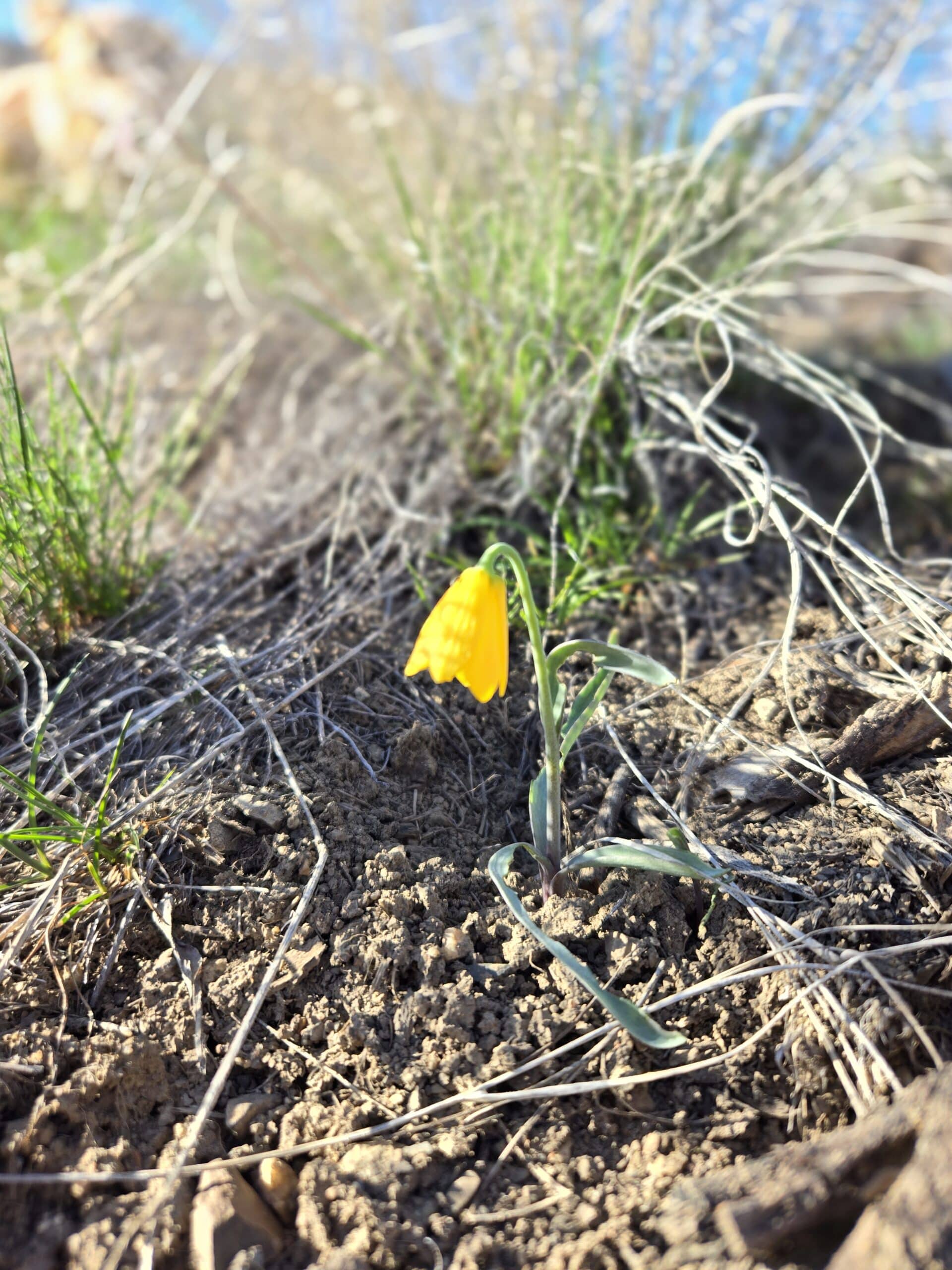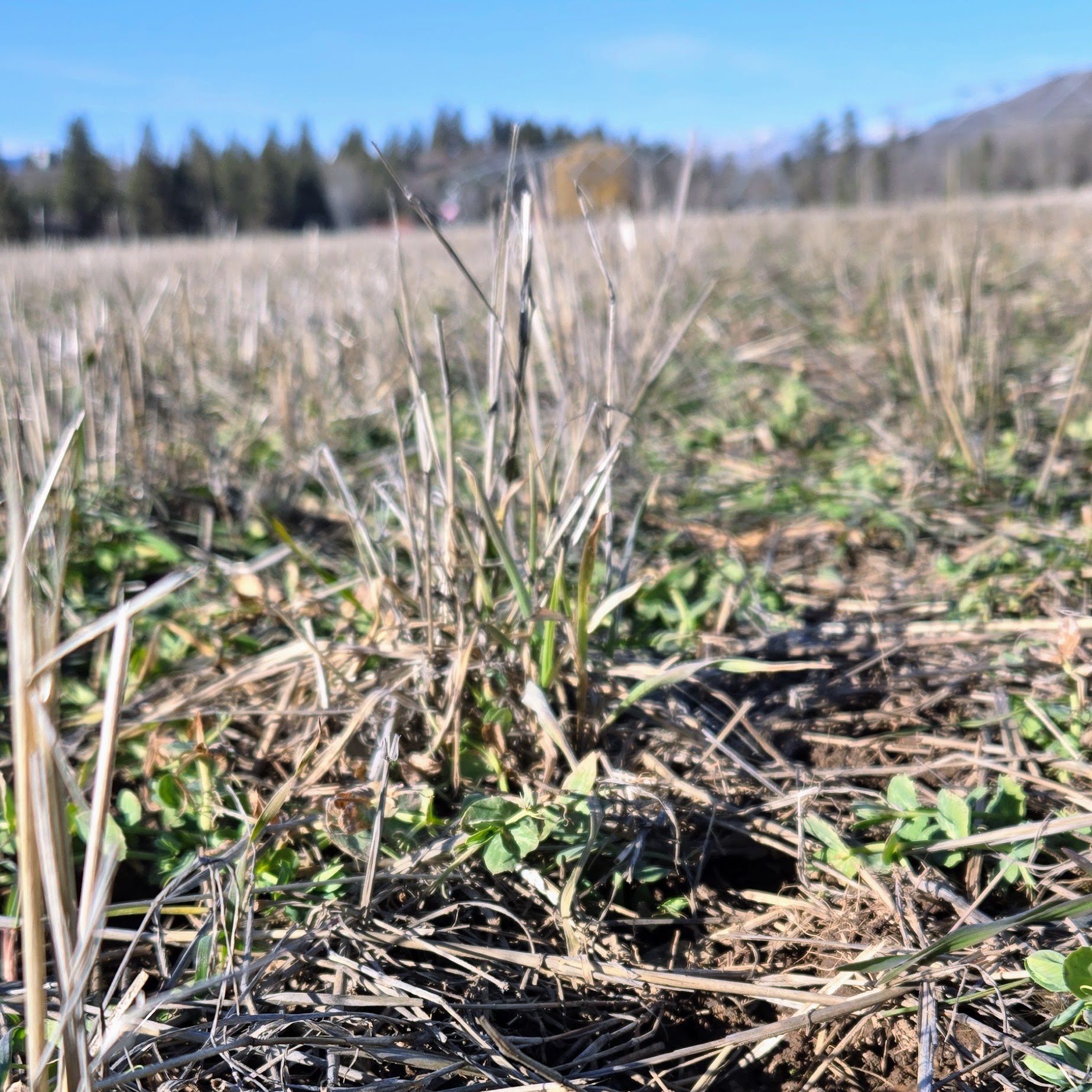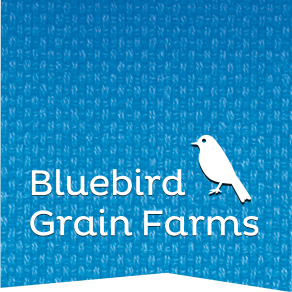
Spring, spring, and more spring! We knew it was early this year, and all the signs of that reality have been at play these past couple of weeks leading up to April. Bluebells on the bare hillsides, bluebirds flitting in the sage. Yellow bells on the hillsides, the yellow throat of the Meadowlark singing that timeless spring song. Robins gorge after a wonderful late March rain, and new snow is caught up on the mountains as the northwest winds kick down the valley. Canada-bound geese shift high overhead. Three days of 70 degrees then nights fell back to the 20’s as snow showers dust the valley floor. Springtime in the Methow – some say the most glorious of all.
Early fieldwork for any year this spring. I believe I’ve only farmed here in March one other time in the past 30 years. This spring I smoothed out last fall’s primary tillage I did on an abandoned neighboring field which I’ve committed to restoring. It felt a little weird to be on the soil before the aspen were budding but the river was on the rise and soil moisture was perfect and when it is time it is time – no matter how early it seems. This neighbor’s field is just south of Winthrop and one I’d also first farmed, like our field here at Bluebird, soon after I arrived in the Methow 31 years ago!. It needs a new irrigation system which we are currently developing. There will not be any supplemental water available this growing season, so I must seed early. As soon as the soil warms I will sow a rehabilitation crop of hardy triticale and spring pea mix.
The winter peas on the home field are just greening up with the first rain, and most look to have made the winter well. Most of us, following the lean snowpack, are hoping for a wet spring indeed.
Our grain cleaning line and flour mill have been very steady through the first full quarter of the year here, and this has kept the crew happy. It is with pleasure that we send out totes and bags of fresh milled flour and grains every day of the week to customers all over as well as right here at home. Fresh whole grains and flours straight to order – always organic and always top grade – is what keeps Bluebird the gold standard for US-grown ancient whole wheat. Our customers know this difference and we couldn’t be more grateful to all of you!
Global grain supply can be an interesting subject. Many of you know that wheat is one of the most commonly grown commodities worldwide. Since we are a global economy, what happens in one country far away can have a large effect locally. In this case, I say local to mean the Northwest and to a greater extent our nation. With recent events in Russia, Ukraine, and Poland, the effect has actually been a downturn in commodity pricing. This is the first downturn in a while. Combined with an uptick in the cost of production – at least for bigger-scale commercial and generally subsidized farms that rely on synthetic fertilizers and pesticides produced elsewhere – the strain is felt on many farmer’s wallets. This is where price support, and more importantly tax-subsidized insurance comes into play. This is what keeps farmers on the fringe, but still growing. This is a farm system in desperate need of repair.
There is not a shortage of wheat worldwide. If you aren’t concerned so much about quality or how it is grown, there is enough wheat stored for 2-3 years. What really hasn’t changed is the fact that only a handful of companies own this supply. Thus, they set the pricing and so forth, as with most commodities. What is bothersome is the fact that people are still starving – right in our own country – while this supply in many cases is left untouched. For the more successful farmers in this game, they sit on the year’s crops and wait for the upturn in prices. For those that are strapped by debt, they sell at bottom pricing to companies that thrive on low-cost bargains. This way, they own an even bigger amount of the supply.
In 1979 there was a book written by Washington Post journalist Dan Morgan called The Merchants of Grain. Fascinating read. And one that in many cases still pertains to the grain world today.
Alas, breathe deep Bluebird folks… we do not play the pricing game. We work hard to pay our partners what they deserve, and they work hard to make sure we stay in business. Relationships are all about relations and this couldn’t have been more demonstrated than when Brooke and I visited our good friends and partners the Schmaltz family last month, on the Northern prairie of North Dakota. The Schmaltz’s are absolute cornerstones in the Regenerative Farm system. Their farm largely works for itself now, wherein very little supplemental nutrients are brought in to support their vast crop rotation. And they love what emmer does for their farm. I will write more on this in my next notes. Stay tuned!
Until then, welcome the slow awakening of Spring. Enjoy the northern lights if you can, and maybe some of the upcoming eclipse. Both are reasons to celebrate and good reminders of our place in this world.
Yours,
Farmer Sam

The cover crop of winter peas survived the snow.

